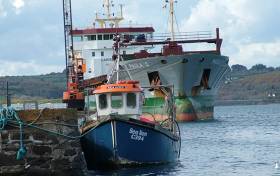Displaying items by tag: Nelson
Sailing By & What You Didn’t Hear About Admiral Nelson
When that lovely piece of music, SAILING BY, rolls from the studio presentation desk through my headphones, I feel a sense of enjoyment at being able to bring a wide tapestry of news, information, stories about the culture, history and the maritime tradition to listeners so many of whom tell me that Ronnie Aldrich’s playing of the programme’s theme music on the LP ‘Sea Dreams’ sets the scene for them. I hope it does for you too because, sitting in the studios of Community Radio Youghal on the East Coast of County Cork, where the sea rolls in from Capel Island and other offshore points, my intention is to make a programme bringing together the maritime community. The response is encouraging and I am grateful to listeners who regularly suggest story lines. The current edition is my 46th programme from the radio studios in Youghal, a town with a huge maritime tradition. It was once the biggest port in the Republic. It was a town with a great schooner tradition, trading to the British coast. There were tragedies when families suffered great losses. The town was chosen as the location for the filming of the famous ‘Moby Dick’ epic. It has gone through a period of industrial decline. Every year it remembers those who have died at sea. It is again looking to build up its maritime resources. It has potential as a cruising port-of-call.
I have devised the programme as Ireland’s maritime programme, broadcast through the community radio service and on Afloat.ie to highlight the importance of the maritime sector to an island nation. The programme of news, stories and information from around the Irish coastline, rivers and lakes, connects the ‘family of the sea’ and relates this connection to the oceans of the world.
In the current edition we travel from Bloody Foreland in County Donegal where we hear about navigational changes noted by the Commissioners of Irish Lights, through connections in Offaly to Dublin Port’s famous Diving Bell and a new song about it by an Irish balladeer who has moved from Liffeyside to Holland. He gives us the honour of being the first to broadcast his composition. With a call to Cork to meet ‘the Irish father of ocean energy,’ and hear how he is concerned about lack of public knowledge of the value of marine energy, we are told a story that has not been mentioned in other media as they recall the blowing up of Nelson’s Pillar in Dublin 50 years ago. There is much more to know about Admiral Nelson as we hear how he defended an Irish revolutionary who wanted to kill the King of England. Together with reports from lifeboat stations around the country and the dominance of Clare in lifesaving, all of these stories make up the wide maritime tapestry of the latest edition of THIS ISLAND NATION which you can hear here.
I hope, like myself, that you enjoy this voyage around the maritime sphere of Ireland and, if you would like to contact the programme, the Email address is: [email protected]





























































